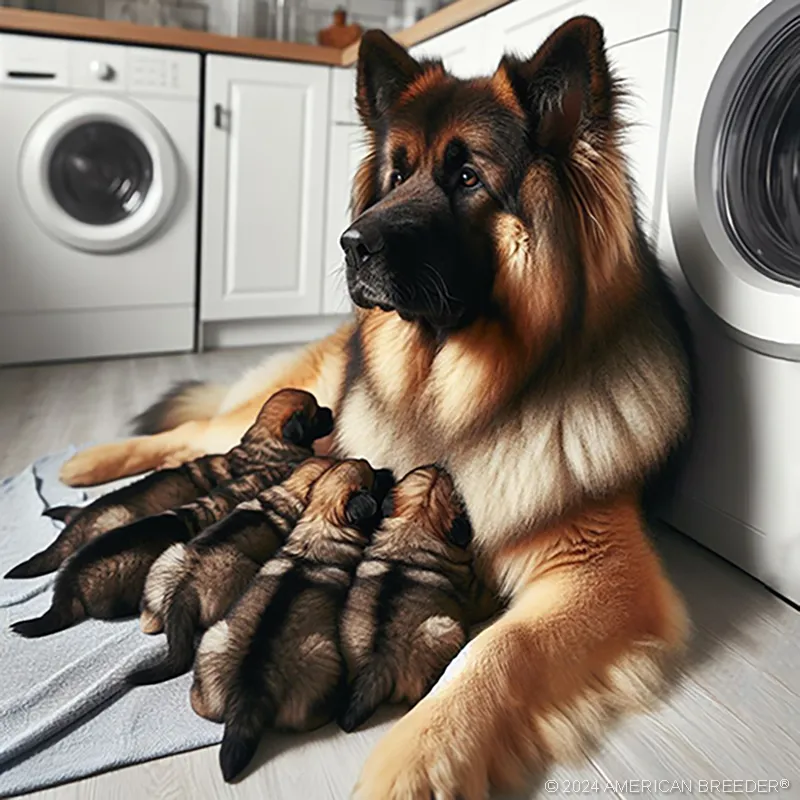The King Shepherd Journey, The Guardians of the Crown
 The King Shepherd Dog, often mistaken for a larger version of the German Shepherd, has etched its own identity in the vast canine universe. This impressive breed embodies strength, loyalty, and a regal presence—qualities that validate its title as the "King." Yet, like every monarch, the King Shepherd's story is rooted in a tapestry of ancestry, evolution, and distinctive characteristics. This guide is a culmination of years of research, veterinary expertise, canine genetics understanding, and a deep appreciation for this exceptional breed.
The King Shepherd Dog, often mistaken for a larger version of the German Shepherd, has etched its own identity in the vast canine universe. This impressive breed embodies strength, loyalty, and a regal presence—qualities that validate its title as the "King." Yet, like every monarch, the King Shepherd's story is rooted in a tapestry of ancestry, evolution, and distinctive characteristics. This guide is a culmination of years of research, veterinary expertise, canine genetics understanding, and a deep appreciation for this exceptional breed.
Origins play a pivotal role in understanding the very essence of a breed. The King Shepherd's ancestry can be traced to the German Shepherd and Shiloh Shepherd. This lineage confers upon the King Shepherd not just its physical attributes but also its temperament, making it an ideal family companion and a vigilant protector. Their majestic appearance and graceful demeanor might lead one to believe that they are merely show dogs, but beneath that exterior lies a world of versatility. From herding to guarding to companionship, their roles in human history have been varied and invaluable.
Delving Deep into the Genetics and Ancestry
The evolution of the King Shepherd is akin to reading a fascinating chapter from a history book. Rooted deeply in the genes of the German Shepherd and the Shiloh Shepherd, the King Shepherd emerged as a breed with enhanced traits, from size to temperament. This genetic blend has resulted in a dog that is robust, larger in size, and has a temperament suited to both work and companionship. Experts in canine genetics can affirm the stable lineage of the King Shepherd, shedding light on how selective breeding has emphasized certain desirable characteristics.
From a veterinary perspective, understanding the genetics also equips breeders and owners with knowledge about potential health issues. The King Shepherd, with its distinct genetic makeup, showcases a mix of both its parent breeds' health profiles. While it enjoys the robustness and vigor of its ancestors, it is crucial for potential owners to be aware of any genetic predispositions.
Understanding the King Shepherd's Behavior and Temperament
In the realm of canine ethology, where behavior and social constructs of dogs are deciphered, the King Shepherd stands out with its unique blend of loyalty, intelligence, and protectiveness. Their behavior is often a reflection of their past—herders, protectors, and companions. While they exhibit a calm demeanor, there's an underlying alertness, always ready to spring into action should the situation demand it. This makes them ideal for families, as they seamlessly transition from playful pals to protective guards.
Training a King Shepherd, given its intelligent and eager-to-please nature, is a rewarding experience. However, their size and strength necessitate early training and socialization. As experts in canine training would attest, consistent, positive reinforcement methods work wonders with this breed. The King Shepherd's dietary needs, guided by canine nutrition insights, ensure they maintain their health and vigor. Their diet should be a balanced mix of proteins, fats, and essential nutrients, tailored to their activity level.
The King Shepherd's Physical Characteristics and Health
A first glance at the King Shepherd might leave one in awe of its majestic presence. Its physical characteristics—a thick double coat, a well-muscled body, and an expressive face—are a testament to its lineage. Colors range from sable to golden, each variant adding to its regal appearance.
But with great size comes great responsibility, especially in terms of health. Veterinary experts specializing in small animal medicine are well-versed with breed-specific medical issues of the King Shepherd. While generally healthy, they can be predisposed to certain conditions like hip dysplasia, a concern inherited from their German Shepherd ancestry. Regular check-ups, a balanced diet, and adequate exercise are non-negotiables to ensure their well-being.
The journey through the world of the King Shepherd is indeed a mesmerizing one, filled with tales of royalty, loyalty, and companionship. As we delve deeper into the subsequent chapters, we unravel more facets of this remarkable breed, offering readers a holistic understanding and appreciation of the King Shepherd.
The World of King Shepherd Training and Socialization
 Training and socializing a King Shepherd is an intricate dance that blends understanding, patience, and technique. Given their heritage as working dogs, King Shepherds are naturally alert, intelligent, and eager to learn. Their sharp intellect can be both an asset and a challenge. On one hand, they can pick up commands swiftly; on the other, they can easily get bored if not stimulated mentally.
Training and socializing a King Shepherd is an intricate dance that blends understanding, patience, and technique. Given their heritage as working dogs, King Shepherds are naturally alert, intelligent, and eager to learn. Their sharp intellect can be both an asset and a challenge. On one hand, they can pick up commands swiftly; on the other, they can easily get bored if not stimulated mentally.
Early socialization is paramount for King Shepherds. Introducing them to a myriad of sounds, sights, people, and other animals during their formative weeks can make a world of difference in shaping their behavior. As they mature, their protective instincts tend to amplify. Without proper socialization, this can manifest as unwarranted aggression or over-protectiveness. However, with the right exposure, they evolve into well-rounded, sociable, and confident canines.
While training them, a blend of consistency and positivity goes a long way. Being descendants of herding dogs, King Shepherds have a natural inclination to take charge. Establishing oneself as the pack leader is crucial. But, this leadership shouldn't stem from dominance but rather from mutual respect and trust. Using positive reinforcement techniques, such as treats, praises, and playtime, fosters a loving bond and ensures the dog associates learning with rewarding experiences.
Nutrition and Dietary Needs of the King Shepherd
Ensuring a King Shepherd thrives means delving into the science of canine nutrition. Their dietary needs aren't just about filling their bowls but understanding the nuances of what fuels their vitality. Being a large breed with a robust physique, King Shepherds require a diet rich in high-quality proteins. This not only supports muscle growth but also aids in tissue repair and overall well-being.
Carbohydrates are another dietary cornerstone. However, it's essential to source them from wholesome grains and vegetables rather than fillers that offer little nutritional value. Fats, particularly omega fatty acids, play a pivotal role in keeping their lush coats shiny and supporting cognitive functions.
Given their size, King Shepherds can be prone to joint issues. Incorporating supplements like glucosamine can be beneficial. However, before introducing any supplements or making significant changes to their diet, consulting with a veterinarian is advisable. Moreover, being vigilant about their caloric intake and ensuring they get ample exercise is crucial to prevent obesity—a condition that can exacerbate potential health problems.
Health and Medical Care for King Shepherds
Tending to a King Shepherd's health is akin to preserving a treasure. While they inherit the robustness of their ancestors, they aren't immune to certain health issues. Hip and elbow dysplasia, conditions tied to their lineage, can be a concern. Regular check-ups, including X-rays, can help in early detection and management.
Another area of focus is their coat. Their thick double coat, while a sight to behold, is also a magnet for ticks, fleas, and other external parasites. Regular grooming, coupled with periodic checks, can mitigate potential problems.
Vaccinations, worming, and dental care form the triad of preventative healthcare for King Shepherds. Regular vet visits ensure they are up-to-date with their shots, free from internal parasites, and maintain good dental hygiene. Given their size and active nature, injuries aren't uncommon. Having a vet who understands the breed's unique needs can be a boon in managing and preventing health issues.
The Intricacies of King Shepherd Genetics
The tale of King Shepherd's genetics is as captivating as the breed itself. Stemming from a fusion of German Shepherds, Alaskan Malamutes, and perhaps other breeds, the King Shepherd's genetic tapestry is woven with strands of strength, intelligence, and versatility.
 One would wonder, "Why does understanding genetics matter?" For breeders, potential owners, and enthusiasts, a grasp of genetics provides insight into predicting temperament, potential health issues, and even the physical attributes of the breed. For instance, King Shepherds, due to their lineage, might carry genes that predispose them to certain hereditary conditions, such as hip dysplasia.
One would wonder, "Why does understanding genetics matter?" For breeders, potential owners, and enthusiasts, a grasp of genetics provides insight into predicting temperament, potential health issues, and even the physical attributes of the breed. For instance, King Shepherds, due to their lineage, might carry genes that predispose them to certain hereditary conditions, such as hip dysplasia.
Furthermore, the color variations seen in King Shepherds, ranging from sables to solids, are a direct result of the interplay of multiple genes. Recognizing the inheritance patterns can help breeders make informed decisions and avoid inadvertent inbreeding.
However, it's not just about physical traits. The genetic cocktail also contributes to their behavioral attributes. The herding instincts from the German Shepherd lineage, combined with the strength and endurance of the Alaskan Malamute, culminate in a breed that's both a diligent worker and a loyal companion.
The Art and Science of Breeding King Shepherds
Breeding King Shepherds is no casual endeavor; it's both an art and a science. The goal isn't merely to produce puppies but to enhance the breed's characteristics while ensuring their well-being.
Breeders start with a deep understanding of the King Shepherd's standard, an outline that describes the ideal physical and behavioral attributes of the breed. This serves as a blueprint, guiding decisions related to selecting mating pairs. The focus remains on enhancing desired traits and minimizing the risk of genetic disorders.
A responsible breeder also considers the health and genetics of the mating pair, often delving into multi-generational pedigrees. This reduces the risks of hereditary issues and ensures the resulting puppies inherit the best of both parents.
Beyond genetics, breeding King Shepherds involves ensuring the health and well-being of the mother during pregnancy, meticulous care during birth, and nurturing the puppies during their initial weeks. A breeder's responsibility doesn't end once the puppies are weaned. Connecting them with responsible homes and providing guidance to new owners is an integral part of the journey.
King Shepherds in the Spotlight - The Show Ring
Stepping into the show ring, a King Shepherd is a spectacle of grace, poise, and magnificence. While dog shows are often seen as platforms showcasing beauty, they serve a more profound purpose. They evaluate how closely individual dogs adhere to the breed standard, ensuring the continuation of desired traits.
Training a King Shepherd for the show ring requires dedication. From an early age, they're acclimatized to the bustling environment of dog shows, from the noise to the presence of other dogs. Their grooming needs to be impeccable, highlighting their majestic coats and robust physique.
In the ring, judges evaluate various attributes, from their stance and gait to their temperament. Each detail, no matter how minute, plays a role in the evaluation. For instance, a King Shepherd's stride should exhibit strength and fluidity, echoing their lineage as working dogs.
However, beyond the shimmer of trophies and rosettes, dog shows play a pivotal role in promoting responsible breeding. They emphasize the importance of adhering to breed standards and dissuade practices that might harm the breed's future.
Tailored Training for the King Shepherd
At the intersection of intelligence and eagerness, the King Shepherd thrives in training scenarios. However, approaching their education requires a nuanced understanding of their temperament and inclinations.
Beginning early is pivotal. Puppyhood, while adorable, is also the most malleable phase. Socialization at this juncture is paramount. Introducing the King Shepherd puppy to various environments, sounds, and experiences lays the foundation for a well-rounded adult. This breed's innate intelligence, combined with their curiosity, makes them eager students. However, their size and strength as they grow mean early obedience training is crucial for manageable adult behavior.
 Training methods should lean heavily on positive reinforcement. The King Shepherd responds best to encouragement and rewards, be it treats, toys, or praise. Their sensitivity means harsh techniques or punishments can be detrimental, leading to distrust or even aggressive behaviors.
Training methods should lean heavily on positive reinforcement. The King Shepherd responds best to encouragement and rewards, be it treats, toys, or praise. Their sensitivity means harsh techniques or punishments can be detrimental, leading to distrust or even aggressive behaviors.
Advanced training can tap into the King Shepherd's versatility. Whether it's agility, search and rescue, or even herding exercises, their prowess can be channeled into various disciplines. However, it's vital to keep sessions engaging. Repetition without variation can dull their interest, slowing the learning process.
A Balanced Diet - King Shepherd Nutrition
Understanding canine nutrition is essential, but when catering to the King Shepherd, specific nuances must be taken into account. As a large breed with an active disposition, their dietary needs differ from smaller or less active breeds.
A King Shepherd's diet should be protein-rich, sourced from high-quality meats. This supports muscle growth and maintenance, particularly given their active nature. However, balancing protein with appropriate fats and carbohydrates is essential to provide sustained energy and maintain optimal weight.
Large breeds like the King Shepherd can be prone to joint issues as they age. Incorporating foods or supplements rich in glucosamine and chondroitin can aid in joint health. Omega fatty acids, found in fish oils, can benefit both skin and coat health, maintaining the breed's majestic appearance.
Portion control is equally vital. Overfeeding can lead to obesity, which, in large breeds, can strain joints and lead to other health complications. Regular vet consultations can aid in determining the optimal diet and portion size, taking into account the dog's age, activity level, and any unique health considerations.
Addressing Behavioral Quirks
Every breed, with its unique genetic makeup and history, presents its set of behavioral quirks. The King Shepherd, with its blend of guardian and working lineage, isn't exempt.
While they're generally known for their balanced temperament, certain situations can trigger instinctual responses. For instance, their herding background might manifest in them trying to "herd" moving objects or even children. This behavior isn't aggressive but can be surprising to those unfamiliar with the breed.
Furthermore, their protective nature means they might be wary of strangers or unfamiliar dogs. Early socialization can temper this, but owners should always be mindful of their dog's comfort zones, ensuring both the King Shepherd and those around them have positive encounters.
Addressing such behaviors isn't about suppression but redirection. Recognizing the root of a behavior allows for effective interventions, channeling the dog's energies into more appropriate outlets.
The Art and Science of Dog Show Judging for the King Shepherd
For those enamored by the King Shepherd's majestic appearance and demeanor, dog shows offer a platform to showcase this breed's brilliance. While many are familiar with the spectacle, fewer understand the meticulous criteria underpinning evaluations in such shows.
 When judging the King Shepherd, a harmonious blend of form and function is paramount. The breed standard serves as a blueprint, detailing everything from coat color and texture to gait and posture. But it's not just about aesthetics; the King Shepherd's historical roles as both protector and herder mean judges look for attributes that signify soundness in both work and temperament.
When judging the King Shepherd, a harmonious blend of form and function is paramount. The breed standard serves as a blueprint, detailing everything from coat color and texture to gait and posture. But it's not just about aesthetics; the King Shepherd's historical roles as both protector and herder mean judges look for attributes that signify soundness in both work and temperament.
Eyes, for example, should exude intelligence and alertness, reflecting the breed's astute nature. The gait should be fluid, with a stride that showcases strength without any hint of clumsiness. The coat, meanwhile, needs to be dense and well-groomed, indicative of good health and care.
Behavioral traits are equally weighted. A well-trained King Shepherd should respond to handler cues with immediacy and precision, displaying both obedience and a bond with the handler. Aggression or excessive timidity can be grounds for disqualification, as these are not traits in line with the breed standard.
Advancements in Canine Research and the King Shepherd
As our knowledge of canine biology and behavior expands, so too does our understanding of individual breeds like the King Shepherd. Recent advancements in genetics have illuminated the breed's lineage, tracing back to its German Shepherd and Shiloh Shepherd ancestors, and highlighting the deliberate breeding choices made to enhance specific traits.
One area of burgeoning interest is the study of breed-specific medical predispositions. For the King Shepherd, like many larger breeds, concerns revolve around joint health. Research is delving into the genetic markers linked to conditions like hip dysplasia, aiming to provide breeders with tools to make informed choices and reduce the incidence of such issues.
Behavioral research has further decoded the King Shepherd's temperament, providing insights into their protective nature, their propensity for loyalty, and their aptitude for various training disciplines. These findings not only help prospective owners know what to expect but can guide training methodologies tailored to the breed.
The Legacy of the King Shepherd
The legacy of the King Shepherd, while younger than many ancient breeds, is one imbued with intention. Crafted from the German Shepherd and the Shiloh Shepherd, breeders sought to magnify the best of both worlds – the loyalty, intelligence, and versatility.
Today, King Shepherds serve in myriad roles, from family companions to working dogs in search and rescue operations. Their adaptable nature, combined with their impressive physical capabilities, means they're equally at home guarding livestock as they are playing fetch in a suburban backyard.
As awareness of the breed spreads, so does appreciation for its unique blend of characteristics. While the path to widespread recognition is still being paved, the King Shepherd's intrinsic merits make it a breed poised for longevity in the annals of canine history.
The King Shepherd in Popular Culture
Few dog breeds capture the imagination like the King Shepherd. With their majestic appearance, intelligence, and poise, it’s no surprise that they’ve found their way into various facets of popular culture, from movies and TV shows to books and social media.
 Films that depict heroes require heroic dogs, and the King Shepherd, with its formidable size and presence, often fits the bill. They've played roles ranging from loyal sidekicks to key plot-driving characters. Even in literature, they are frequently portrayed as symbols of loyalty, bravery, and tenacity.
Films that depict heroes require heroic dogs, and the King Shepherd, with its formidable size and presence, often fits the bill. They've played roles ranging from loyal sidekicks to key plot-driving characters. Even in literature, they are frequently portrayed as symbols of loyalty, bravery, and tenacity.
The rise of social media has further propelled the King Shepherd's popularity. Their photogenic faces and playful antics make them stars on platforms like Instagram and TikTok. Many King Shepherd owners proudly share their daily adventures, training successes, or even simple bonding moments, garnering millions of followers and making certain King Shepherds online celebrities in their own right.
The Global Appeal of the King Shepherd
Though the King Shepherd has its roots in the United States, its appeal is truly international. The reasons are multifaceted. For one, the breed's balanced temperament, combined with its striking looks, resonates universally among dog lovers. Moreover, as globalization paves the way for the sharing of culture, dog breeds too cross borders, either through media representation or breeding programs.
European and Asian dog enthusiasts have shown an increasing interest in the breed. International dog shows have begun to see more King Shepherd participants, reflecting the breed's growing acceptance and admiration. Moreover, breed-specific clubs and societies dedicated to the King Shepherd have started emerging in countries outside its native homeland, further cementing its global appeal.
The Future of the King Shepherd
As with any breed, the future of the King Shepherd lies in the hands of responsible breeders, owners, and enthusiasts. With growing recognition comes the responsibility to ensure the breed's integrity, both in terms of physical characteristics and temperament.
Genetic research offers promising avenues to address health issues prevalent in larger breeds, and as such, the adoption of these tools by King Shepherd breeders will be pivotal. Concurrently, potential owners must be educated about the breed's specific needs and characteristics to ensure a harmonious match.
Given the King Shepherd's many strengths, from their adaptability and intelligence to their loyalty and protective nature, it seems certain that their popularity will only continue to soar. As ambassadors of the breed, every King Shepherd has the potential to shape perceptions and, in doing so, carve out a future where they are not only admired but also understood and cherished.
With a blend of history, heart, and hope, the King Shepherd's story is a dynamic one. It speaks to human ingenuity, our eternal bond with canine companions, and the shared journey ahead. Whether you're an admirer from afar or fortunate enough to share your home with one, the King Shepherd undoubtedly leaves an indelible mark on the heart.
King Shepherd Dog Quick Reference Guide
Breed Background: Origin: United States | Breed Purpose: Working and companion | AKC Class: Not officially recognized | Year Recognized by AKC: N/A
 Appearance: Size: Males: 27-31 inches, Females: 25-29 inches | Weight: Males: 100-150 lbs, Females: 75-125 lbs | Coat Type: Long-haired, plush, short-haired | Colors & Patterns: Sable shades, black and tan, solid black, white | Distinctive Features: Dense double coat, sturdy build
Appearance: Size: Males: 27-31 inches, Females: 25-29 inches | Weight: Males: 100-150 lbs, Females: 75-125 lbs | Coat Type: Long-haired, plush, short-haired | Colors & Patterns: Sable shades, black and tan, solid black, white | Distinctive Features: Dense double coat, sturdy build
Temperament: Energy Level: 4 | Loyalty: 5 | Friendliness to Pets: 4 | Friendliness to Strangers: 3 | Trainability: 4 | Playfulness: 4 | Frequent Barker: 3 | Chase Instincts: 4 | Sense of Smell: 4 | Drive to Hunt: 3
Health & Care: Health Issues: Hip dysplasia, autoimmune disorders | Lifespan: 10-12 years | Grooming Difficulty: Moderate (especially during shedding seasons) | Exercise Needs: High, daily rigorous activity
Socialization: Interaction with Children: Gentle and protective | Interaction with Pets: Generally friendly, early socialization recommended | Interaction with Strangers: Cautious but can be socialized | Elderly Compatibility: Good, if well-exercised | Ease of Training: Moderate, consistency required
Suitable Living Arrangements: Apartment: No | House: Yes | Rural Area: Yes | Yard Size Requirements: Medium to Large
Training & Obedience: Trainability: 4 (1: Easy, 5: Challenging) | Intelligence: 5 (1: Low, 5: High) | Obedience: 4 (1: Low, 5: High) | Problem-Solving: 4 (1: Limited, 5: Advanced) | Easily Stimulated: 4 (1: Low, 5: High) | Focus Level: 4 (1: Low, 5: High) | Easily Distracted: 3 (1: Low, 5: High)
Financial Planning: Typical Price Range: $1,500-$3,000 | Initial Expenses: Vet check-ups, vaccinations, training, initial supplies | Ongoing Annual Expenses: Food, grooming, regular vet check-ups, toys, training refreshers
Breeding: Reproductive Maturity: 18-24 months | Litter Frequency: Once per year | Litter Size: 6-10 puppies | Stud Cost: Varies based on lineage, typically $500-$1,500 | Breeding Challenges: Ensuring genetic health, managing large breed pregnancy and birth
Did You Enjoy this Article? Share it and Help Us Spread the Word!
If you found this article helpful, we'd appreciate it if you could share it with your friends or link to it from your website, blog, or group! You can also use the convenient social share tabs on the left side of the screen to instantly share this page to your social media feed. For more ways to support and promote the American Breeder Community, visit our Share & Promote Together page for social media posts and memes you can copy and share. Your support means the world to us!
Disclaimer: The information provided in this article is for general informational purposes only and does not constitute legal, medical, financial, or professional advice. While we strive for accuracy, we make no representations or warranties regarding the completeness, accuracy, reliability, or suitability of the information. Please consult with a professional before making decisions based on the content provided. American Breeder Inc. assumes no responsibility for any errors or omissions or for the results obtained from the use of this information.
